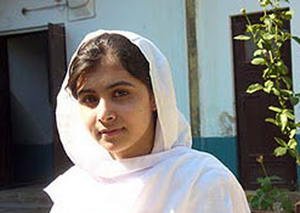
Islamabad, October 9: A 14-year-old Pakistani girl, who emerged as an unlikely champion of peace in the former Taliban stronghold of Swat, was seriously injured when a suspected militant attacked her car in the country's restive northwest today.
Malala Yousufzai, the first recipient of Pakistan's National Peace Award for Youth, was hit by at least two bullets when the gunman fired at her car in Swat, located 160 km from Islamabad.
Two other children were injured in the attack that occurred outside Yousufzai's school.
Yousufzai was rushed to a hospital in Saidu Sharif town where doctors performed an emergency surgery, TV news channels reported.
Security forces cordoned off the hospital. The attack occurred as the girls were leaving the school after it closed early due to a protest by government employees.
The gunman asked people in the area to point out Yousufzai and then fired at her car, witnesses said.
No group claimed responsibility for the attack.
Yousufzai received several threats after she began writing about the excesses of the Taliban in a blog.
In March, Tehrik-e-Taliban Pakistan spokesman Ihsanullah Ihsan said Yousufzai and social worker Shad Begum were on the militants' 'hit list'.
Shad Begum was among 10 women conferred the International Women of Courage Award by the US. Yousufzai received the first National Peace Award for Youth from former premier Yousuf Raza Gilani in December last year for her "courageous and outstanding services for the promotion of education and peace under extremely hostile conditions" in Swat.
The teenage girl was a victim of the ban imposed by the Taliban on education for girls after the Swat region was overrun by the militants in 2008.
She wrote about her pain and anguish while blogging for BBC Urdu under the pseudonym Gul Makai.
Yousufzai had encouraged her fellow students to continue their studies despite threats from militants before the military launched an operation to flush out the Taliban from Swat in 2009.
Besides being nominated for the International Peace Prize for Children, she was also decorated with the Sitara-i-Jurat.
The government sent the army into Swat in early 2009 after the Taliban began extending their influence to districts located 100 km from Islamabad.
Hundreds of Taliban fighters were captured or killed but most of the top commanders, including Mullah Fazlullah, managed to escape to Afghanistan.





Comments
Add new comment